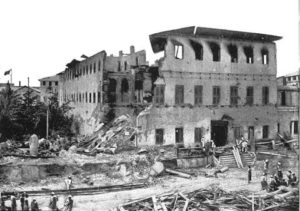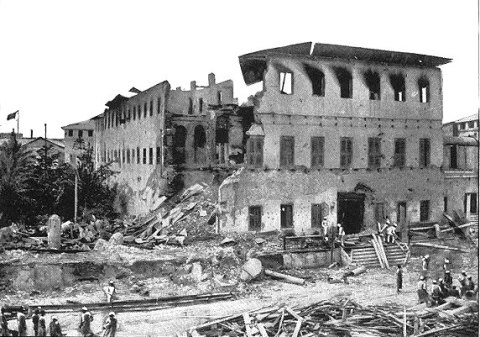Article VI. Three British Wars with Funny Names and Some Importance
The Shortest War in History:


The little-known Anglo-Zanzibar War of 1896 is generally considered to be the shortest war in history, lasting for a grand total of 38 minutes.
The logical beginning of the issues that led to the war is the signing of the of the Heligoland-Zanzibar treaty between Britain and Germany in 1890. This treaty effectively drew up spheres of influence between the imperial powers in East Africa; Zanzibar was ceded to British influence, whilst Germany was given control over mainland Tanzania. Neither African country nor their peoples had a say in the matter. Great Britain almost immediately declared Zanzibar to be a protectorate of the British Empire and moved to install their own “puppet” Sultan to look after the region. Hamad bin Thuwaini–who had been a supporter of the British in the area–was given the position in 1893. bin Thuwaini was pliable and cooperative with his British overlords, and everything seemed to be headed towards peace and security with Zanzibar comfortably ensconced in the mighty empire.
bin Thuwaini ruled over this relatively peaceful protectorate for just over three years. But then, the sultan died suddenly in his palace on August 25, 1896. Although the truth will never be fully known about the causes for his death, it was widely believed that his cousin, Khalid bin Barghash, had him poisoned. No evidence has ever been obtained to decide one way or the other. However, the belief that Hamad bin Thuwaini met with foul play, is enhanced by the fact that within a few hours of Hamad’s death, Khalid had already moved into the palace and assumed the position of Sultan, all without British approval.
Khalid was not known to be as pliable or as much of an anglophile as his uncle, and it would be an understatement to say that the local British diplomats were not at all happy with this turn of events. They reacted quickly and strongly. The chief British diplomat for the area, Basil Cave, quickly declared that Khalid should stand down. Khalid ignored these warnings and instead starting gathering his forces around the palace.
His armed forces were surprisingly well armed; many of their guns and cannons were diplomatic gifts that had been presented to the former Sultan over the years, and were, therefore, of excellent English manufacture. By the end of August 25, Khalid had his palace secured with almost 3,000 men, several artillery guns, and even a modestly armed Royal Yacht in the nearby harbor. Things were moving swiftly, and the British felt duty-bound to respond.
The British already had two warships anchored in the harbor, the HMS Philomel and the HMS Rush. Troops were quickly being sent ashore from the formidable vessels to protect the British Consulate and to keep the local population from rioting. Cave requested backup from another nearby British ship, the HMS Sparrow, which entered the harbor that evening.
Cave had a significant armed presence in the harbor, but he did not have the authority to open hostilities without express approval of the British government. He rushed to get the authority to proceed.
To prepare for all eventualities, he sent a telegram to the Foreign Office in Whitehall that evening asking: “Are we authorized in the event of all attempts at a peaceful solution proving useless, to fire on the Palace from the men-of-war?”
While waiting for a reply from Whitehall, Cave continued issuing ultimatums to Khalid which he ignored.
The next day, two additional British warships entered the harbor–the HMS Racoon and the HMS St. George–the latter carrying Rear-Admiral Harry Rawson, commander of the British fleet in the area.
At the same time, Cave had received a telegraph from Whitehall stating: “You are authorized to adopt whatever measures you may consider necessary, and will be supported in your action by Her Majesty’s Government. Do not, however, attempt to take any action which you are not certain of being able to accomplish successfully.”
The next day, August 26, Cave issued his final ultimatum to Khalid demanding that he leave the palace by 9 am the next day. Cave also demanded that all non-military boats leave the harbor in preparation for war.
At 8 am the next morning–only one hour before the ultimatum expired–Khalid sent a reply to Cave stating: “We have no intention of hauling down our flag, and we do not believe you would open fire on us.”
Cave was British to his core, and he replied in true 19th century British diplomatic style, that he had no desire to fire upon the palace “but unless you do as you are told, we shall certainly do so.” There were no adjectives or other language of exception.
Cave did not hear from Khalid before the deadline; and at 09:00 sharp, the order was given for the British ships in the harbor to begin bombarding Zanzibar Palace. By 09:02 the majority of Khalid’s artillery had been destroyed, and the palace’s wooden structure started to collapse with 3,000 defenders still inside. At this time–two minutes after the bombardment started–Khalid escaped through a back exit of the palace, leaving his servants and fighters to defend the palace alone. The man has not been revered for his heroism in Zanzibar records.
The shelling ceased at 09:40; the Sultan’s flag was pulled down; and the shortest war in history officially ended after only 38 minutes by the ships’ clocks. Although the war was unusually brief, the casualty rate was surprisingly high; more than 500 of Khalid’s fighters were killed or wounded, mainly due to the high explosive shells exploding on the palace’s flimsy structure. One British petty officer was also severely injured, but later recovered in hospital. He was the only British sailor to be wounded in action.
With Khalid out of the way, the UK was free to place the pro-British Sultan Hamud on the throne of Zanzibar, and he ruled on behalf of Her Majesty’s Government for the next six years. He had a smooth run.
Khalid—having learned a lesson from the master British teachers–managed to escape with a small group of loyal followers to the local German Consulate. Despite repeated calls from the British for his extradition, he was smuggled out of the country on October 2nd by the German navy and taken to modern day Tanzania. It was not until British forces invaded East Africa in 1916 that Khalid was finally captured and subsequently taken to Saint Helena for exile. After serving time, he was later allowed to return to East Africa where he died a natural death in 1927.


